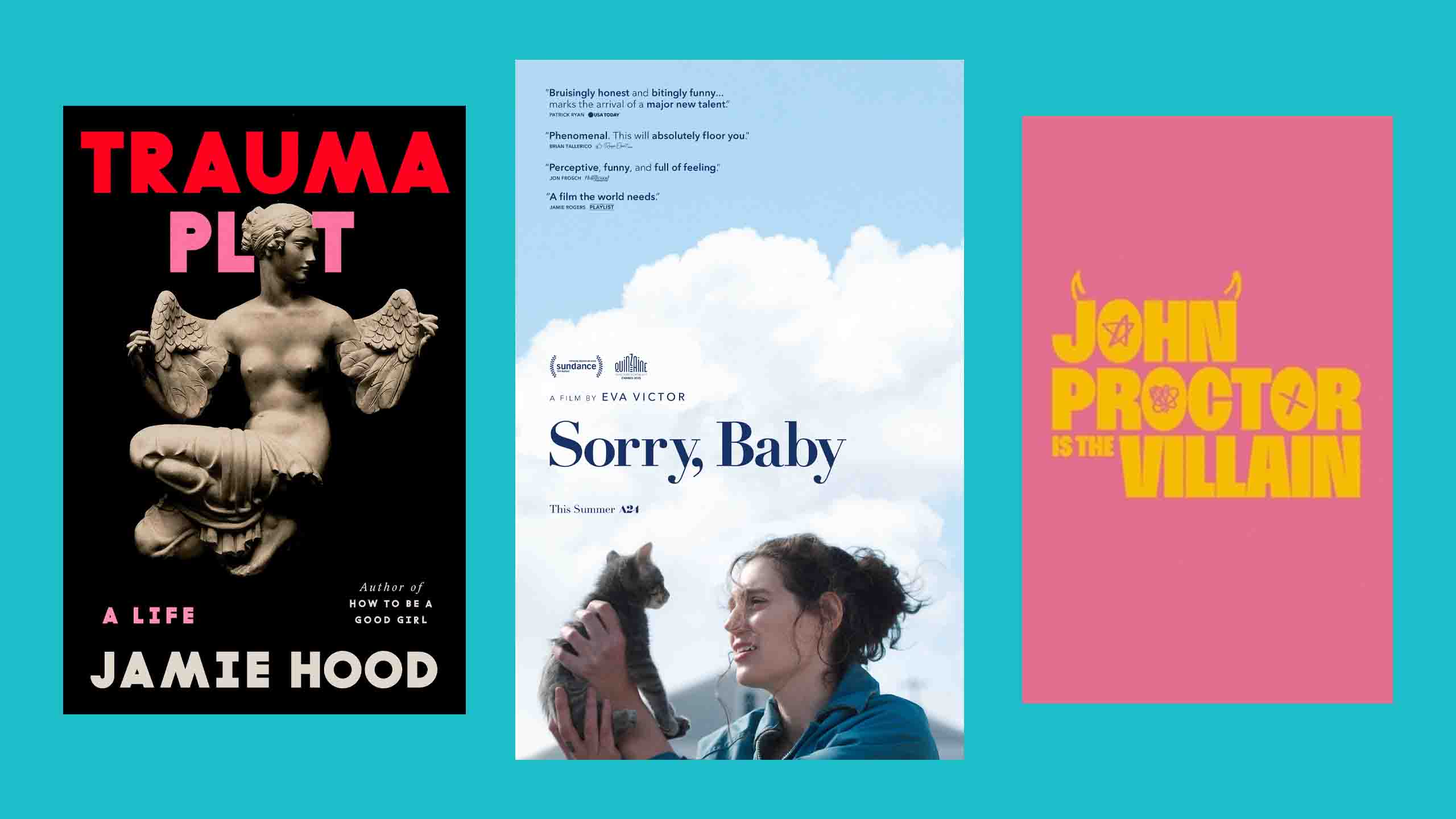After she’s raped, Sorry, Baby protagonist Agnes (Eva Victor) gets into her car and drives away. Her face is blank. When she finally gets to the home she shares with her best friend, Lydie (Naomi Ackie), Agnes says only, “My pants are broken.” Lydie takes one look at her, and draws her a bath.
It’s different from the type of assault story we’ve become accustomed to: what writer Sanjena Sathian calls the “Me Too social thriller.” These films—movies like Don’t Worry Darling (2022, dir. Olivia Wilde)), The Perfection (2018, dir. Richard Shepard) and, of course, Promising Young Woman (2022, dir. Emerald Fennell)—focus their efforts on finding shocking ways to hammer home that rape culture exists and is bad.
Their protagonists are armed, dangerous and out for blood (if they aren’t covered in it already). They’re all ready to kill their rapist—but he’s indisposed.
He’s shaking hands in the boardroom or from the pulpit, drafting his syllabus for next semester or appearing in an indie film whose press tour gives him ample opportunity to discuss how much he’s “worked on himself” since all that sordid business with her. Maybe he’s running for political office. Maybe he’s already won.
In other words he’s outgrown them, and the genre they belong to.
Over the last seven years, many perpetrators of sexual violence have been granted opportunities to rehabilitate their reputations, often by other men accused of similar atrocities. They’ve been aided and abetted in moving beyond the genre. Meanwhile, their accusers have often been abandoned and thus remained frozen in place.
Like I Spit On Your Grave (1978, dir. Meir Zarchi) and the broader rape-revenge horror genre before them, Me Too social thrillers are enjoyed by many. Some people who’ve experienced assault find these stories cathartic, clever, badass. Others don’t. While rape culture tries to flatten its targets, those who face sexual violence will never be a monolith. But it’s not surprising that in the too-often disappointing seven years following the peak of the Me Too movement, the media we made about sexual assault sort of stagnated.
These stories haven’t moved beyond pointing angrily at rape culture because society hasn’t either. Today, the most meaningful narratives about assault reflect that fact, capturing how closely it mirrors the experience of assault itself.
Sorry, Baby, the melancholy, frank, hilarious feature directorial debut of Eva Victor, who also wrote and stars in the film, follows professor Agnes during four years of arrested development after she’s assaulted by her PhD advisor. Agnes, suspended in amber, goes on living in the same house, teaching at the same college and even works out of her advisor’s old office after he abruptly leaves the school, ostensibly to avoid the consequences of his actions. One night, overwhelmed by the darkness outside, Agnes tapes the pages of her thesis to her window in place of a curtain. Marked with red lines by her advisor’s pen, they almost resemble a conspiracist’s cork board, like she’s trying to understand how this could have happened. The pages yellow on her window for years, blocking out the sun.
Jamie Hood’s recent book,memoir/cultural analysis Trauma Plot: A Life also captures how the trauma and loneliness following assault can shrink and darken your world. In Trauma Plot, Hood describes enduring multiple brutal rapes without sufficient care or support, unpacking “three decades marred by sexual violence and the wreckage left behind.
“I’m lately thinking about how invisible trans women have been made in the conversation despite our being at an escalated risk for sexual and other forms of intimate violence,” Hood writes. “But no one fucking cares, and this is partly because transmisogyny makes us, in a discursive sense, unrapeable. The status quo’s sexual prohibition against trans women means we’re not even understood as fuckable, let alone lovable, and if we can’t be fucked, how could we possibly have been raped?” Trans women are constantly accused of dishonesty, about everything from their intentions to their identities. “I’ve never felt like a believable victim,” Hood writes, “because I rub so many people the wrong way. It’s like they think bitches don’t get raped.”
During the height of Me Too, those who’d already endured assault lay their worst experiences bare. They weathered staggering scrutiny as the layers of their stories were peeled back and examined, and then were often told that what they had to say was unconvincing, unsympathetic or believable but simply unimportant.
Both Sorry, Baby and Trauma Plot capture intimately the counterintuitive inertia of a trauma that’s treated as trivial, either by the people around you or by the simple, audacious passage of time—the way life shoves by you, no matter what.
“In the movies, they make it seem like your whole life stops when you get raped, but I kept arriving at the awful truth that nothing about it would stop,” Hood writes.
In Sorry, Baby, life passes Agnes callously by too. When she has a panic attack in the parking lot of a sandwich shop, the owner leads her through some breathing exercises and then asks if something bad has just happened to her. No, she tells him, it was a little over three years ago.
“Well that’s not that much time,” he responds. “I mean it’s a lot of time. But it’s not that much time too.”
And he’s right.
John Proctor Is the Villain, a play written by Kimberly Belflower that first opened in 2022 and debuted on Broadway in 2025, follows a high school class reading The Crucible in 2018 as conversations about Me Too bubble up and over all around them. It being set seven years ago can make viewers feel horrified at how little has changed. And yet its characters are vital, immediate. They’re full of the wild tenderness and weirdness of teenagers, fierce and powerless, doing everything they can to protect one another and themselves. These kids don’t know what kind of story they’re in, only what kind they’re reading—and considering the past leads them to rebuke the brutal lesson being forced on them at present.
Perhaps because Hood is a scholar of confessional writing, which captures a snapshot of the broader societal context along with its image of the author, she embeds current events and her reactions to them in the narrative of Trauma Plot. As she writes about rape as dehumanization, she can’t stop thinking about Palestinians in Gaza, where “the Israel Defense Forces is using rape as a tactic of war and no one will talk about it.” But Hood does talk about it, refusing defeatist silence, consciously embedding a record of this atrocity in her own story.
All three of these stories present complex characters viewed through the lens of not just what they’ve survived, but how. They reckon in their own ways with the crystallized cultural ideas we have about expected behaviour in the aftermath of assault, whether those ideas emerge from Arthur Miller or Parul Seghal. They complicate the gendered dynamics of rape by exploring queerness, both seriously and playfully. And, crucially, they focus on the relationships their characters have with everyone other than those who abused them.
Hood wants to get a dog but hesitates, wondering if her tenuous desire to stay alive means she shouldn’t be responsible for another living thing. Then she adopts sweet Olive, a rescue to whom her book is dedicated. “You’re broken up by your love of her, transformed through it, see you must go on living because of it,” she writes.
The heart of Sorry, Baby is the relationship between Agnes (who dresses like the platonic ideal of a tweedy professor and adds an ambivalent extra bubble to a form question about gender) and her best friend Lydie (Naomi Ackie), a lesbian whose baby, Jane, gives the film its name. At one point they go to a dinner party hosted by a petulant, competitive former classmate who starts up a round of sharing horror stories from their program, and needles Agnes for not contributing. Lydie, who knows why Agnes flees to the bathroom when the topic of “bad things that happened to us in grad school” arises, turns back to the dinner and wrinkles her nose.
“There’s a bone in the fish that you served me,” she says pointedly, totally destabilizing their thoughtless hostess. “Maybe you should debone it a little bit better before you serve it to people.”
One scene in John Proctor, the only one that takes place outside of the classroom, features two characters sitting together at the gas station. They’re best friends, just beginning to reconcile. It happens the way those things always do—slowly at first and then all at once, until they’re collapsing against one another in fits of inconsolable giggles. Later, they perform an interpretive dance together that is every inch as silly as it is stunning.
One of the most powerful things about these stories is an old idea: connection between the women in them, and all those who will come after. While some base this connection on a shared lineage of pain, Hood points out that defining womanhood on the basis of trauma is delegitimizing and limiting (not to mention “moronic and insulting on its face”).
Instead, in these stories, it’s a lineage of care.
“I’ll always jump in the ring for the earnest, the cringe, the sentimental, the too much,” Hood vows in Trauma Plot. It calls to mind a moment at the end of John Proctor, one of the most emotional scenes in a play notorious for making people cry like goddamn babies. Shelby climbs onto her teacher and abuser’s desk during a darkly exaltant tour de force of a dance performance to Lorde’s “Green Light” and jumps off. When she hits the tile—still for a moment before she gets up and keeps dancing—it flashes blood red, as bright as a battlefield, as a dance floor.
Of course, these are far from the first narratives about assault to centre the interiority, grief, uncertainty and unpalatability, rather than single-minded action-hero revenge drives, of their protagonists. But it’s striking how called-for they feel right now, when “did Me Too go too far?” has become an acceptable question to ask in public, and the U.S. government is stuffed to the very brim with men who’ve been accused and/or convicted of sexual harassment and assault. These stories capture the way trauma stops time in a way that also reflects and rebukes the letdown of the last seven years. And in doing so, they present evidence for our ongoing ability to evolve past that disappointment.
In a lot of ways, these stories are very different from one another.
In Sorry, Baby, when Agnes comes home after being assaulted and relays the experience to Lydie with a sort of flat, shell-shocked affect, Lydie responds, “That sounds like … that. That is … that’s the thing. I’m really, really sorry.” They both know what the other means: they don’t need to say it. The effect is at once understated and overwhelming.
Hood, in contrast, rails against the idea that rape can’t or shouldn’t be named. “Perhaps we’re convinced it’s unspeakable by those who wish us not to speak it, who know silence protects them,” she writes. And: “This pretense of wordlessness is a tool of the tormentor. It doesn’t serve.”
Their difference is the point. They are outside the lines of what we’ve come to expect—to an extent that it makes us realize how absurd it is that we’ve come to expect anything specific at all from stories about sexual violence.
“I’m sorry that bad things are gonna happen to you,” Agnes tells baby Jane. “I hope they don’t. If I can ever stop something from being bad, let me know. Sometimes bad stuff just happens.” The moment is more subdued than its analogues. And in 2025, the genre is broad enough to hold that difference.


 Why you can trust Xtra
Why you can trust Xtra


